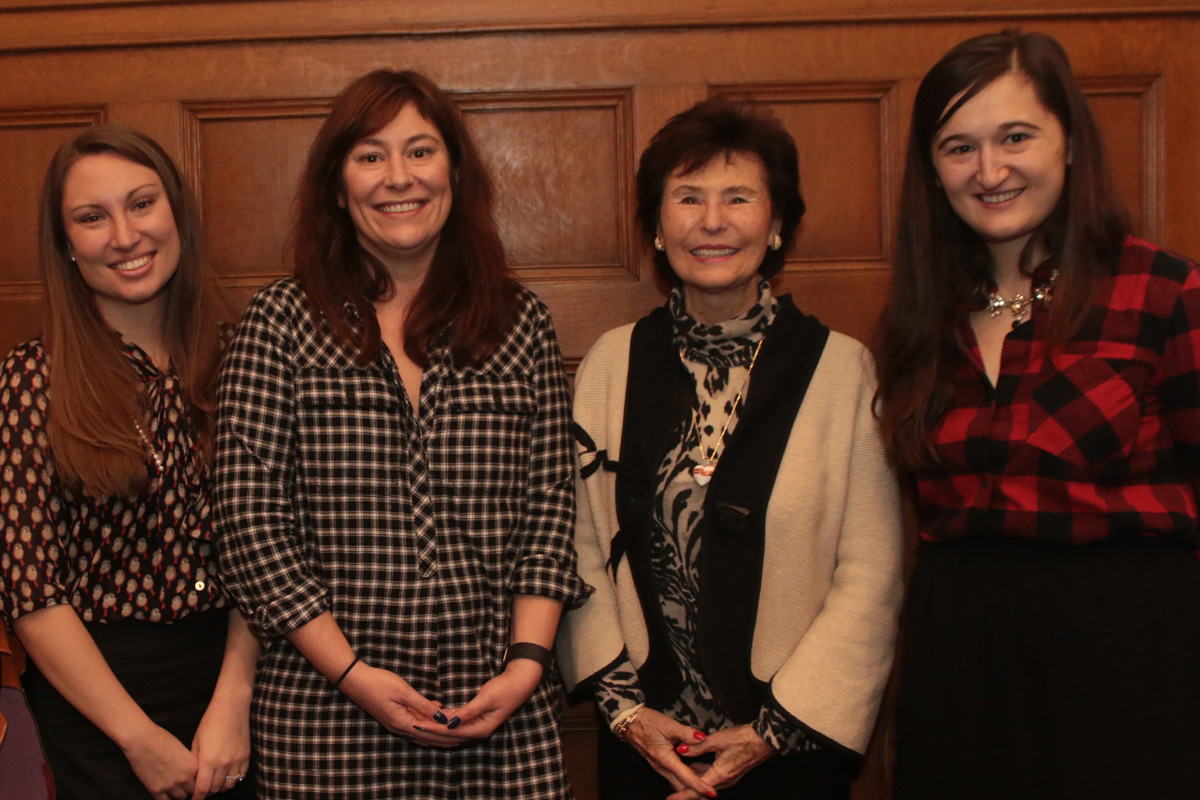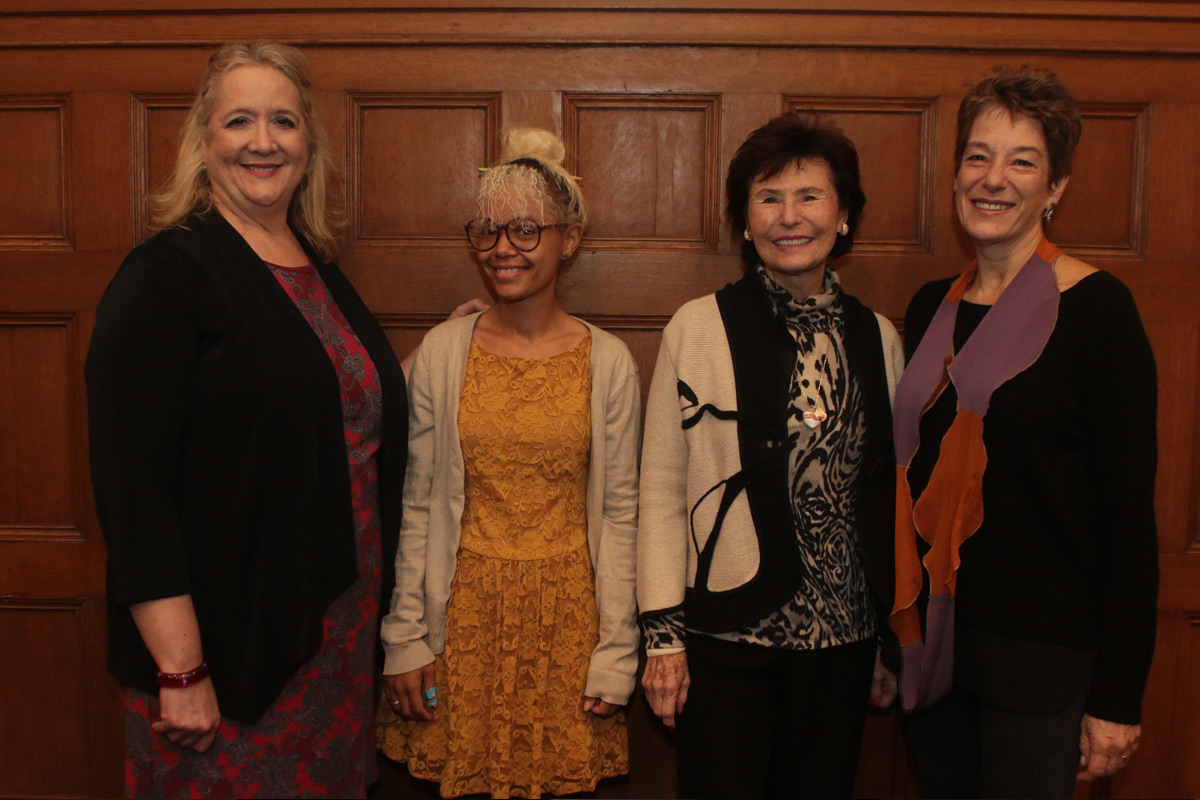When she was a student in the 1960s, Evalyn Milman (M.A. ’64) lived in Greenwich Village. Every morning, she’d take her guitar with her on the subway ride to Teachers College. She loved to sing and play guitar, so she took whatever music classes she could fit into her schedule.
Later, when she taught early elementary school, Milman played guitar and piano for her students. The children sang along and tapped out the beat with tambourines and percussion instruments. After obtaining an additional master’s degree in Art History at Hunter College, Milman went on to become a highly successful curator, producer of a television interview program and owner of a cultural tour company, but she has never forgotten that tableau. She is a supporter of New York Philharmonic Young Peoples Concerts and Philharmonic in the Schools program.

PROMOTING LITERACY AS WELL In 2012, Milman generously funded the Evalyn Edwards Milman Literacy Fellowship at TCCS. Pictured here: current Milman Literacy Fellows Alyson Rumberger, Jamie Uva and Jenna Lampesis. (Photo: Desiree Halpern)
“The children were transfixed by music,” she recalls. “They would focus on the rhythm, the tempo, the dynamics. I had some difficult children in my classes, and they responded, too. To a young child, music is a language, a form of expression. It’s a magical opportunity for children’s imaginations. I feel strongly that children should be exposed to music in school – the earlier the better.”
Now the Evalyn Edwards Milman Music Education Fellowship is allowing TC students to teach music in public schools. As with the Literacy Fellowship that Milman created in 2012, the goals are to help under-resourced schools and to help outstanding TC students further their research and practice.
Specifically, Milman Education Fellows will play a key role in expanding the innovative music program developed at Teachers College Community School to other schools in REACH (Raising Educational Achievement Coalition of Harlem), TC’s network of partnerships with schools in northern Manhattan. At TCCS, the program currently runs from pre-kindergarten through fifth grade, but expands each year as the school, which will eventually serve pre-K—8, continues to add new grades. The progression mirrors students’ intellectual, psychological and emotional development. The youngest children focus on movement, singing, playing with instruments and making up songs to stories. By second grade they’re learning some music notation and other aspects of music that are representative of broader adult culture. In the third grade, all children learn to play the violin; in the fourth, they sing in a choir and have the option to play in an after-school orchestra; and in the fifth they take composition and have the option to sing in an after-school choir.
“To a young child, music is a language, a form of expression. It’s a magical opportunity for children’s imaginations. I feel strongly that children should be exposed to music in school – the earlier the better.”
Ayanda Dalamba, the inaugural Milman Music Education Fellow, is now piloting expansion of aspects of the TCCS music program at PS 154. Dalamba, who is earning her master’s degree in music education, teaches music there two days a week. Before her arrival, the school had no music program. Like Milman did many years before her, Dalamba sings and plays music with the children.
“After I graduate I want to continue teaching music, so this fellowship is an invaluable experience for me and I’m grateful to Evalyn for funding it,” says Dalamba, who previously taught for several years in the Toronto school system. “The children in my classes are from low-income families and needy neighborhoods. They would not have had music without this fellowship.” [Click here to read a story on Dalamba.]
Associate Professor Lori Custodero, the creator of the music curriculum at Teachers College Community School, says that part of the work of Fellows like Dalamba will be to learn the culture of the school and its families – a key ingredient for making the curriculum work.
“Our curriculum is like a jazz chart,” says Custodero, a co-creator of “WeBop!” at Jazz at Lincoln Center, and the Very Young People’s Concerts at the NY Philharmonic. “It’s got the outlines, it’s got the ‘head,’ [theme] but we don’t know always know exactly how it will play out until we get there and learn about the kids’ strengths and needs.”
Support student scholarship:
- Pledge $50,000 to create a new endowed scholarship in your own name or someone else’s.
- Contribute to an existing tribute or program fund scholarship
- Support a TC Fund Scholar or designate your TC Fund gift to financial aid.
Contact Linda Colquhoun at 212 678-3679.
The Milman Fellows will all be mentored by Custodero and other TC faculty. They will also assist classroom teachers in connecting music to other areas such as literacy, math and social studies and will conduct professional development workshops with school staff and teachers.
All of which delights Milman, who recently visited PS 154 to observe Dalamba’s class. The fellowship program, she says, will help transform TC students into great music teachers. In her eyes, teaching is a “gift,” but having a “feel for children and for music” can be developed with the right training.
“I continue to support TC because I believe in its mission, and because Susan Fuhrman is doing such a great job as President,” says Milman. “The quality of students at TC is so high that I know the fellowships will help the music program educate the best teachers.”
